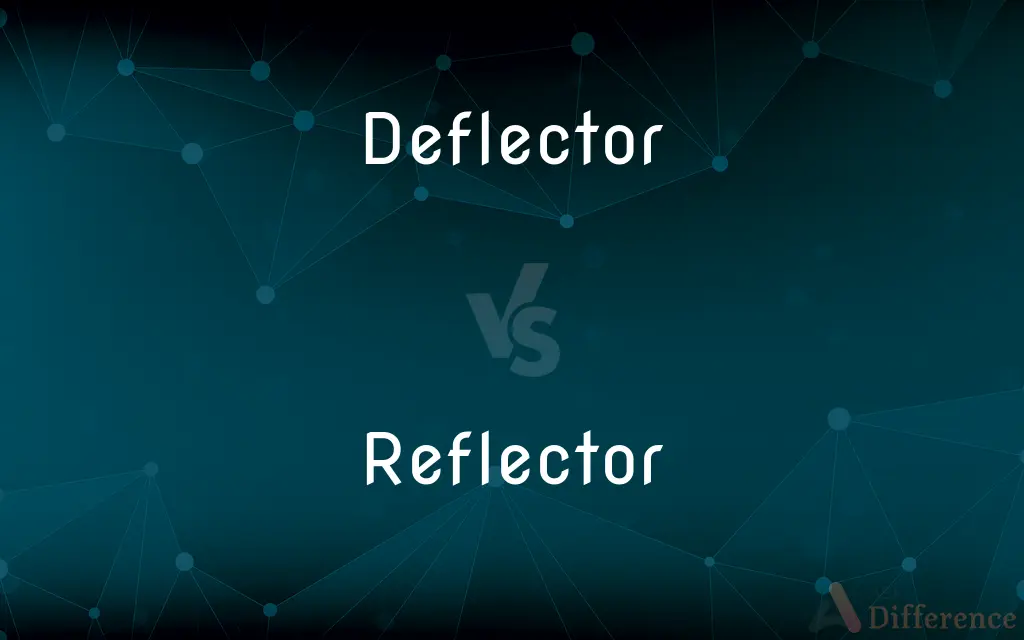Deflector vs. Reflector — What's the Difference?
By Urooj Arif & Fiza Rafique — Updated on May 2, 2024
A deflector diverts the path of objects or waves by altering their trajectory, while a reflector bounces light, sound, or other waves back toward their source.

Difference Between Deflector and Reflector
Table of Contents
ADVERTISEMENT
Key Differences
A deflector is used to change the direction of objects or energy waves without necessarily sending them back to their original source. In contrast, a reflector specifically bounces waves such as light or sound directly back toward their origin.
Deflectors are commonly used in contexts like shields in spacecraft or wind deflectors on vehicles, where the goal is to redirect harmful or undesired particles and forces. On the other hand, reflectors are used in optics, such as mirrors or in radar technology, where the precise redirection back to the source is crucial for functionality.
The material and design of a deflector are chosen based on its ability to withstand and redirect specific types of energy or objects. Whereas, reflectors are designed with a focus on preserving the energy or wave properties upon reflection, such as maintaining the intensity and angle of light.
In technology, deflectors might be seen in magnetic fields used to redirect charged particles in particle accelerators. Meanwhile, reflectors are integral to the design of telescopes, cameras, and other imaging devices where accurate reflection is necessary for image capture and analysis.
Environmental applications also differ; for example, water deflectors manage fluid flow to prevent erosion or flooding, while solar reflectors concentrate sunlight for heating or energy generation purposes.
ADVERTISEMENT
Comparison Chart
Function
Changes direction of objects or waves
Bounces waves back to their source
Common Uses
Spacecraft shields, vehicle wind deflectors
Mirrors, radar dishes, telescopic lenses
Design Focus
Durability and ability to redirect
Accuracy of reflection, preserving wave properties
Material
Depends on application (metals, composites)
Often reflective surfaces like silvered glass
Environmental Use
Flood barriers, airflow management in buildings
Solar cookers, light reflectors in lighting
Compare with Definitions
Deflector
A device that alters the path of particles or waves.
The spacecraft uses a magnetic deflector to protect against cosmic radiation.
Reflector
A device that sends waves back towards their source.
The mirror in a telescope is a crucial reflector that focuses light.
Deflector
Often used to prevent undesirable interactions.
Car wind deflectors reduce drag and noise while driving with open windows.
Reflector
Integral to various optical instruments.
Periscopes use reflectors to allow submariners to see above the water.
Deflector
Included in many safety and engineering designs.
Blast deflectors at airports protect areas from jet engine exhaust.
Reflector
Material is usually smooth and shiny to preserve wave integrity.
Aluminum coatings are used for reflectors in lighting fixtures.
Deflector
Varies in material based on specific needs.
Heat shields on spacecraft are thermal deflectors made from specialized materials.
Reflector
Plays a role in energy efficiency.
Building reflectors redirect natural light, reducing the need for artificial lighting.
Deflector
Can be part of a system managing environmental elements.
River deflectors help control water flow and prevent bank erosion.
Reflector
Used to enhance visibility or signal detection.
Reflectors on bicycles make them visible to motorists at night.
Deflector
To turn aside or cause to turn aside; bend or deviate.
Reflector
Something, such as a surface, that reflects.
Deflector
Something which deflects something else, especially a stream of fluid or particles.
Reflector
A reflecting telescope.
Deflector
A diaphragm in a lamp, stove, etc. by which the flame and gases are brought together to improve combustion.
Reflector
Something which reflects heat, light or sound, especially something having a reflecting surface.
Deflector
(science fiction) A force field; an invisible barrier used as a protective shield.
Reflector
A reflecting telescope.
Deflector
That which deflects, as a diaphragm in a furnace, or a cone in a lamp (to deflect and mingle air and gases and help combustion).
Reflector
A small, often red, reflecting disk on the rear of a vehicle or bicycle that reflects the headlights of other vehicles.
Deflector
A device intended to turn aside the flow of something (water or air or smoke etc)
Reflector
A safety reflector.
Reflector
One who reflects on something; one who thinks or considers at length.
Reflector
One who, or that which, reflects.
Reflector
Something having a polished surface for reflecting light or heat, as a mirror, a speculum, etc.
Reflector
Device that reflects radiation
Reflector
Optical telescope consisting of a large concave mirror that produces an image that is magnified by the eyepiece;
Isaac Newton invented the reflecting telescope in 1668
Common Curiosities
What is a deflector used for?
A deflector is used to change the path of physical objects or energy waves to avoid direct impact or to manage flow.
Where might you find a deflector in everyday life?
Deflectors are commonly used in vehicles as wind deflectors and in environmental management systems.
How does a reflector work?
A reflector works by bouncing waves, such as light or sound, back towards their original source, often to enhance or focus them.
Can a deflector and reflector be used together?
Yes, in many systems such as certain types of antennas, deflectors and reflectors are used together to direct and enhance signals.
What are the typical materials used for reflectors?
Reflectors are typically made from materials with high reflective properties, like mirrored glass or polished metals.
What are the safety applications of a deflector?
Deflectors are used in safety applications like radiation shields in medical and space technology.
Are deflectors and reflectors subject to specific regulations?
Yes, both are subject to regulations depending on their use, especially in safety-critical applications like transportation and infrastructure.
What role do reflectors play in energy conservation?
Reflectors are used in energy conservation by directing light or heat to maximize efficiency, as seen in solar panels and eco-friendly lighting.
How do deflectors affect environmental engineering?
Deflectors play a critical role in environmental engineering by managing water flow, controlling erosion, and aiding in air quality management.
What innovations are being seen in reflector technology?
Innovations include the development of more efficient reflective materials and designs that improve functionality in optics and energy sectors.
Share Your Discovery

Previous Comparison
Genomics vs. Proteomics
Next Comparison
Inquiry vs. ProbeAuthor Spotlight
Written by
Urooj ArifUrooj is a skilled content writer at Ask Difference, known for her exceptional ability to simplify complex topics into engaging and informative content. With a passion for research and a flair for clear, concise writing, she consistently delivers articles that resonate with our diverse audience.
Co-written by
Fiza RafiqueFiza Rafique is a skilled content writer at AskDifference.com, where she meticulously refines and enhances written pieces. Drawing from her vast editorial expertise, Fiza ensures clarity, accuracy, and precision in every article. Passionate about language, she continually seeks to elevate the quality of content for readers worldwide.













































